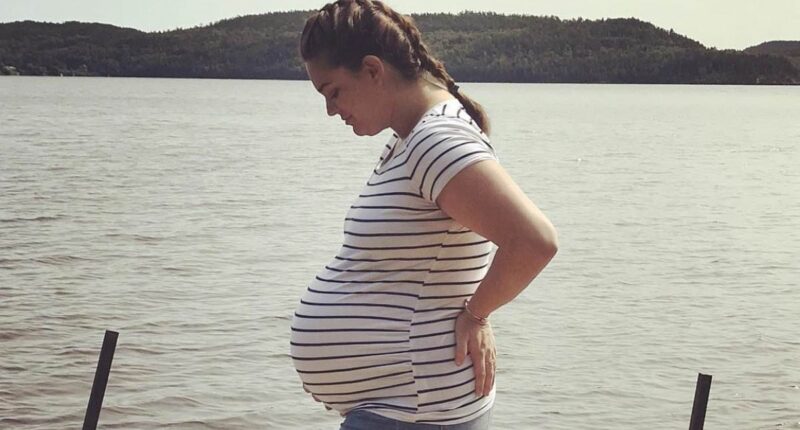Ariel Taylor loved being pregnant, but knew that after having her daughter, she was done having children for herself.
Wanting to help others, the Ontario, Canada-native decided to become a surrogate, carrying not one other baby, but five.
Surrogacy is a process in which a woman carries and gives birth to a baby on behalf of another woman, often because she cannot get pregnant or carry a fetus herself. It is often the way LGBTQ couples are able to expand their families.
The practice is highly controversial, with some conservative groups like the Heritage Foundation calling it ‘exploitation’ that ‘turns the female body into a commodity for hire,’ and reduces women ‘to “rent-a-womb” service providers.’
Ms Taylor, 33, is used to hearing these criticisms and questions about her motives. Many people, she said, fear she is being exploited for her womb.
She said: ‘The truth is, we are just regular women who want to help someone else by carrying their baby.’
After giving birth to her daughter in 2015, Ms Taylor birthed four more babies from 2017 to 2024.
She said: ‘I think many people assume that surrogates feel sadness or disappointment after the birth but for many of us, it’s quite the opposite. I look back so fondly on my surrogacy journeys.’

Ariel Taylor, 33, has been a surrogate five times and an egg donor six times, motivated by her desire to help others experience parenthood

Ariel began her surrogacy journey in 2015 after giving birth to her daughter and realizing she wanted to help others experience parenthood. Over eight years, she carried five surrogate pregnancies, including two for the same family
A small proportion of babies born every year arrive via surrogacy – roughly 750 to 1,000.
A woman who decides be a surrogate for another undergoes in vitro fertilization. During this process, she is impregnated when doctors create an embryo by fertilizing the intended mother’s egg (or an egg from a donor) with sperm from the father (or a donor).
While Ms Taylor did not share genetic material with the babies she birthed, she remained a fixture in their lives.
She said: ‘There’s a misconception that surrogates never see the children again but in my experience, we’ve become family friends.
‘These children know who I am and it’s wonderful to be a part of their lives in some way.’
Her surrogacy journey began in 2016.
After giving birth to her daughter Scarlet a year prior, she knew she did not want another child of her own, but also knew she liked being pregnant and could use that to help others.
In January 2016, she matched with a family and their embryo was implanted in her uterus. Unfortunately, she miscarried four months later.
She tried again in the fall of 2016, and gave birth to her first surrogate baby in August 2017. She birthed another in December 2018, one in April 2021, and the last in July 2023.

Ariel said the most rewarding part of the process is handing babies to their parents. She maintains relationships with the families

Ms Taylor is pictured with her daughter Scarlet (right) and a baby she carried
Ariel, a fertility therapist and founder of the surrogacy support network Carried with Love, said: ‘Handing over the baby to their parents was always the most rewarding part of the process.
‘I was really lucky that pregnancy seemed to agree with me most of the time. It made me feel happier and I didn’t gain a lot of weight or have complications.’
She carried as many babies as she could, undergoing the maximum number of c-sections allowed for surrogate mothers – four.
After her fifth birth in the summer of 2023, she had a more difficult post-partum period. She was puffy, swollen, and sore all over.
She said: ‘It was my body’s way of saying, “That’s enough,” and I had to accept that it was the end of my pregnancy journey.
‘I’ll always cherish the experiences I had. I think I was made for surrogacy. And what a really nice way to use my body for good.’
In addition to being a surrogate five times, she has also donated her eggs to six different families hoping to have babies.

Ms Taylor is pictured with her partner Brandon (right) and a baby she gave birth to. She said Brandon is highly supportive of her journey and agrees that surrogacy is a great act of service

Pictured is a couple Ms Taylor helped by acting as a surrogate, and their child who she carried

People tend to believe that once they give birth, surrogate mothers lose contact with the families they helped. Ms Taylor, though, is close family friends with all of the couples she helped and is present in the children’s lives
Women hoping to be surrogate mothers have to fulfil a long list of criteria: live in a surrogacy-friendly state, be between 21 and 43, be in good health with a history of healthy pregnancy and delivery, a BMI of about 32 or below, and a recent history free of major surgeries and pregnancy complications.
Potential surrogates also have to be non-smokers, non-drinkers, and drug-free. They cannot have a history of mental health disorders and must undergo a psychological evaluation. They also have to be financially stable with a clean criminal record.
Surrogates in Canada do not profit off their decision to carry another woman’s baby. It is illegal to pay or offer to pay a woman to be a surrogate mother.
However, surrogates can be reimbursed for expenses related to the process ranging from doctor visits, medications, and travel to maternity clothes, groceries, and lost wages.
Ms Taylor told DailyMail.com: ‘On my first journey I was reimbursed $20,000 and on my last journey, I was reimbursed $35,000 which included all of my lost wages. The other ones were all in between those amounts.’
For each pregnancy, she kept thorough receipts for every purchase. Some of the other expenses she was reimbursed for included prenatal classes, vitamins, childcare, visits to the chiropracter, and more holistic care like accupuncture and massage.
She said: ‘So the simple answer is that I made no money.
‘In fact on my last journey, my expenses were much higher than my expenses cap and I only took two weeks off after the birth.’
In the US, meanwhile, surrogates can be paid $100,000 or more to carry a person or couple’s baby and the intended parent or parents also take on all of her healthcare costs during the pregnancy.
One of the factors that complicates surrogacy in the US is that it’s not legal in every state. Nebraska and Louisiana currently prohibit paid surrogacy.
Paid surrogacy was brought to the spotlight in the 1980’s by a controversial legal case wherein a surrogate who was paid to carry the pregnancy of a couple in New Jersey had a change of heart after giving birth, and decided she wanted to keep the baby.
The couple who paid the woman to carry the child sued, and were eventually granted custody. In response, New Jersey, New York and other states instated a ban on paid surrogacy that lasted years.
The case – known popularly as ‘baby M’ – made surrogacy a national controversial topic, with people questioning the ethics of wealthy couples paying surrogates – who are sometimes substantially poorer – for the temporary use of their womb.

















